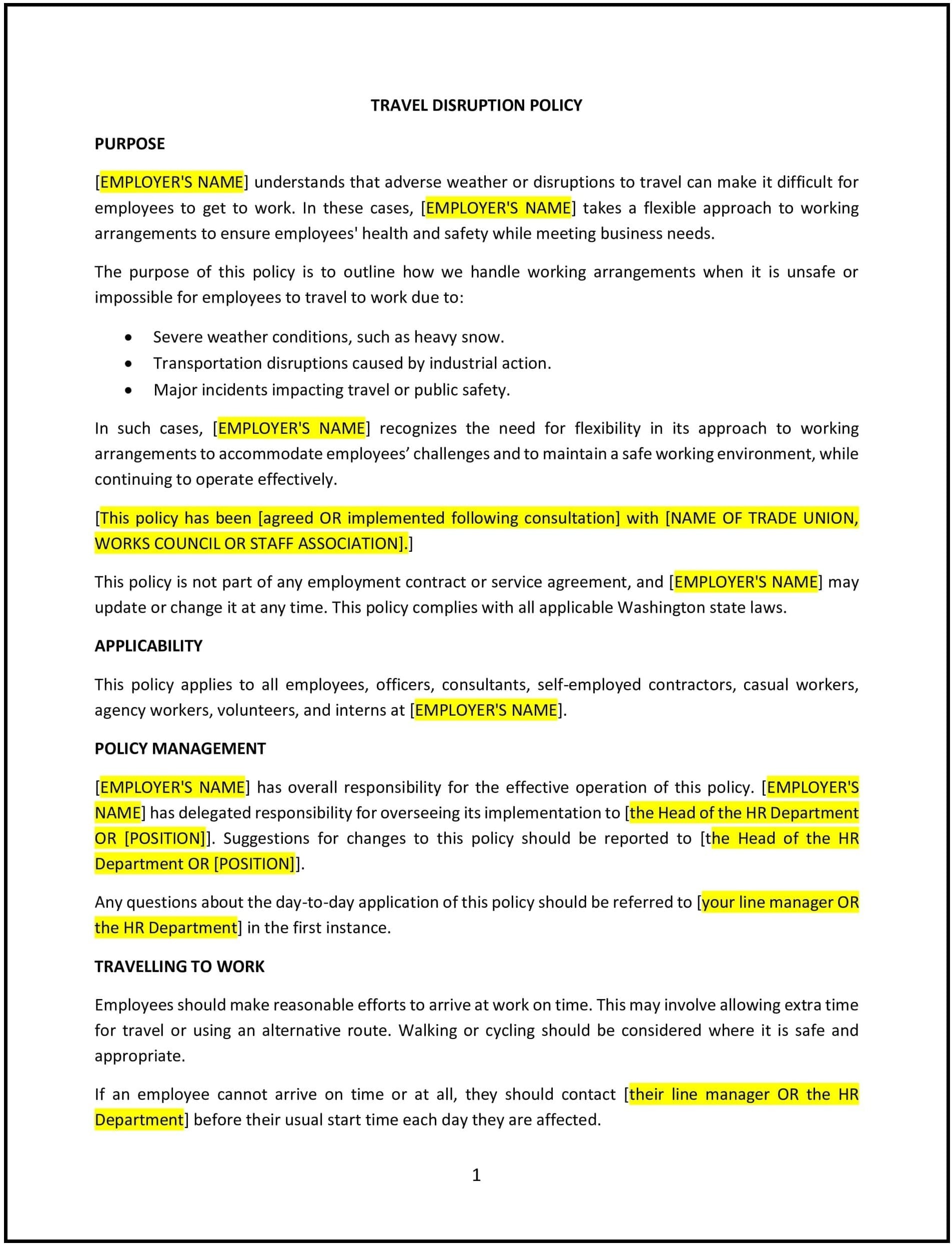Travel disruption policy (Washington): Free template
Got contracts to review? While you're here for policies, let Cobrief make contract review effortless—start your free review now.

Customize this template for free
This travel disruption policy is designed to help Washington businesses manage the challenges that arise from travel disruptions, such as delays, cancellations, or unexpected changes to travel arrangements. The policy outlines the procedures for addressing travel disruptions, the responsibilities of employees during these events, and the steps the business will take to minimize operational impact. The goal is to ensure that employees are supported during travel disruptions while maintaining business continuity.
By adopting this policy, businesses can reduce the impact of travel disruptions on operations, ensure employees are informed and supported during travel-related issues, and improve compliance with Washington state laws.
How to use this travel disruption policy (Washington)
- Define travel disruptions: The policy should specify what constitutes a travel disruption, including flight delays, cancellations, weather-related issues, transportation strikes, or other unforeseen circumstances that prevent employees from arriving at their destination as scheduled.
- Establish reporting procedures: The policy should outline the steps employees need to take when they experience a travel disruption. This includes reporting the issue to their supervisor, HR, or the travel coordinator, and providing updates on the expected arrival time.
- Set expectations for employee flexibility: The policy should clarify that employees are expected to be flexible and make reasonable efforts to resolve the disruption as quickly as possible. This may include rebooking flights, finding alternative transportation, or adjusting meeting schedules.
- Address expense reimbursement: The policy should specify whether employees are eligible for reimbursement of additional expenses incurred due to travel disruptions, such as accommodation, meals, or transportation costs. It should provide guidelines for submitting expense reports and the documentation required for reimbursement.
- Provide support for employees: The policy should outline the support employees will receive during travel disruptions, including assistance from the company’s travel department or external travel agencies. It should also address how the company will assist employees in rescheduling or rebooking travel arrangements.
- Manage business continuity: The policy should specify how the company will manage operations when employees are delayed or unable to attend meetings or events due to travel disruptions. This may involve rescheduling meetings, making alternative arrangements, or adjusting deadlines as needed.
- Ensure compliance with Washington and federal laws: The policy should ensure compliance with Washington state laws and federal regulations related to employee rights during travel disruptions, including labor laws and expense reimbursement guidelines.
- Review and update regularly: Periodically review and update the policy to ensure it remains compliant with Washington state laws, federal regulations, and any changes in company operations. Regular updates will help ensure the policy stays relevant and effective.
Benefits of using this travel disruption policy (Washington)
This policy offers several benefits for Washington businesses:
- Supports employee well-being: By addressing travel disruptions and providing clear procedures for reporting and resolving issues, the policy supports employees’ needs during stressful situations, ensuring they are informed and taken care of.
- Reduces operational disruptions: By having a clear plan for managing travel disruptions, businesses can minimize the impact on operations, ensuring that productivity is maintained even when travel plans are altered.
- Increases transparency: The policy provides clear guidelines for employees on how to handle travel disruptions, reducing confusion and ensuring that everyone understands their responsibilities and the company’s expectations.
- Promotes fair treatment: The policy ensures that all employees are treated fairly when they encounter travel disruptions, offering support and reimbursement as appropriate while maintaining consistency in how disruptions are handled.
- Improves company reputation: A company that effectively manages travel disruptions and supports employees during these events enhances its reputation as a responsible and employee-focused organization.
- Supports compliance with legal requirements: The policy helps businesses comply with Washington state laws and federal regulations, particularly those relating to employee rights and expense reimbursement, reducing the risk of legal issues.
Tips for using this travel disruption policy (Washington)
- Communicate the policy clearly: Ensure that all employees understand the travel disruption policy and know the steps they need to take in the event of a disruption. Include the policy in the employee handbook, review it during onboarding, and provide periodic reminders.
- Be flexible when necessary: Recognize that travel disruptions are often outside of employees’ control. The policy should encourage flexibility and understanding, ensuring employees have the support they need to resolve the issue without facing negative consequences.
- Monitor travel disruptions: Track and document travel disruptions to assess the impact on operations and identify any patterns or recurring issues. This information can help inform future policy adjustments or improvements to travel planning.
- Provide clear guidance on reimbursement: Clearly outline the process for reimbursing employees for expenses incurred due to travel disruptions. Specify what types of expenses are eligible for reimbursement and the documentation employees need to submit.
- Plan for business continuity: Have contingency plans in place to manage business operations when key employees are delayed or unable to attend meetings or events. This may include rescheduling meetings, assigning alternate team members, or adjusting project timelines.
- Review and update regularly: Periodically review the policy to ensure it remains compliant with Washington state laws, federal regulations, and any changes in the company’s operations. Regular updates will help keep the policy relevant and effective.